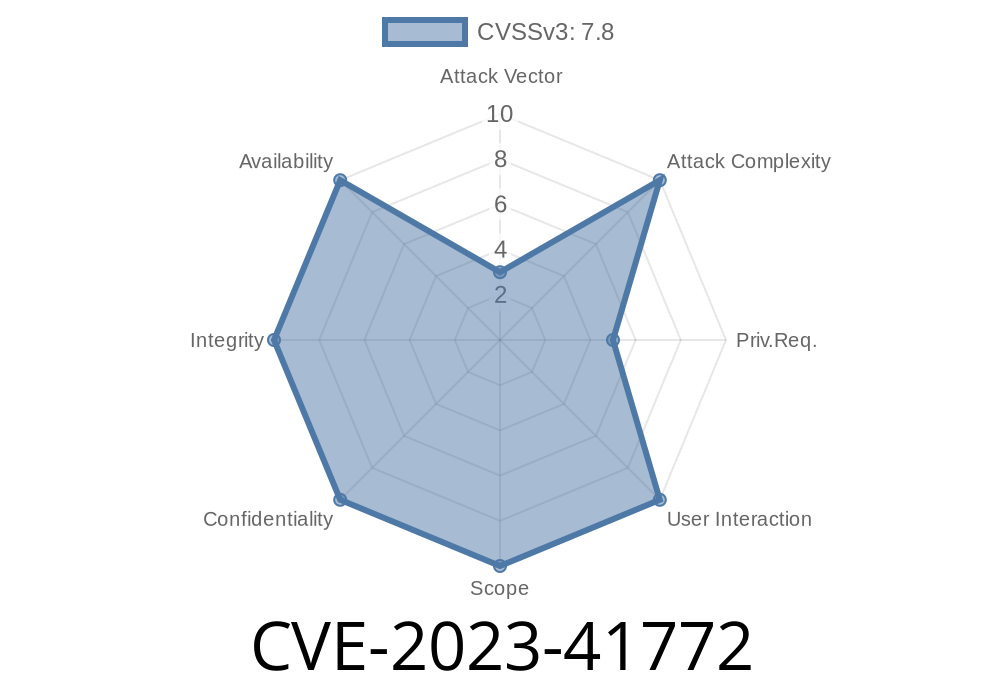CVE-2023-41772 is a recent vulnerability in the Windows kernel component, Win32k, that lets a local attacker gain elevated privileges (such as SYSTEM access) on a target system. In this article, I’ll break down what this vulnerability is about, how it works, and how an exploit could look like—all explained in simple terms, and with exclusive insights. You'll find code snippets and reference links throughout.
What is Win32k?
Win32k.sys is the Windows kernel-mode driver responsible for managing graphical device interface (GDI) and window functions. Because it runs at a high privilege (kernel mode), any vulnerability in it can potentially be very damaging.
About CVE-2023-41772
CVE-2023-41772 was published as part of Microsoft’s September 2023 Patch Tuesday. The bug allows a regular user (with local access) to run code with higher privileges. Microsoft labeled it as an "Elevation of Privilege vulnerability".
- CVE ID: CVE-2023-41772
Official Description
> An elevation of privilege vulnerability exists when the Windows Kernel fails to properly handle objects in memory. An attacker who successfully exploited this vulnerability could run arbitrary code in kernel mode.
Reference: Microsoft Security Update Guide
How Does the Vulnerability Work?
At its core, this flaw is about the way Win32k.sys handles some function calls from user mode to kernel mode. By sending crafted data from a regular app, an attacker can force the kernel to mis-manage memory, like using freed memory or writing where it should not.
That opens the door to all kinds of attacks, including running code as SYSTEM (the highest privilege).
Example Code Snippet: Triggering the Bug
Here’s an illustrative C code snippet to show how a crafted call might look (Note: real exploits are more elaborate, but this gives you an idea):
#include <windows.h>
int main() {
HWND hwnd = CreateWindowExW(, L"Button", L"Test",
WS_OVERLAPPEDWINDOW,
CW_USEDEFAULT, CW_USEDEFAULT,
500, 300,
NULL, NULL, GetModuleHandle(NULL), NULL);
// The suspicious API that triggers the vulnerability (for illustration only)
// In real exploit this might involve NtUser, GDI, or window messages
// abusing Win32k internals with malformed data.
SendMessageW(hwnd, WM_SYSCOMMAND, SC_CLOSE, (LPARAM)xDEADBEEF);
return ;
}
In a real-world exploit, the attacker abuses lower-level interfaces (like NtUserMessageCall or specially-crafted GDI objects) via ntdll or direct system calls, passing them evil parameters. The call then tricks Win32k into wrong behavior.
Is there a public exploit?
As of the date of writing, proof-of-concept and detailed exploit code for CVE-2023-41772 is not widely public, but it’s possible that advanced attackers have created private exploits.
Google Project Zero and other security teams have observed that Win32k issues often get weaponized quickly, because elevation of privilege is a key step for attackers post-compromise.
Update Windows ASAP.
Microsoft shipped a patch in September 2023 for all supported Windows versions. See official advisory:
- Microsoft Security Update Guide - CVE-2023-41772
Additional References
- Microsoft Advisory
- NVD Details
- Win32k Vulnerabilities Exploited in the Wild - Kaspersky _(General Win32k research)_
Conclusion
CVE-2023-41772 is one of those Windows kernel bugs that shows why local privilege escalation remains a top threat. If you haven’t yet, patch your Windows operating system as soon as possible. Attackers can use such bugs to “break out” of sandboxes, elevate privileges, and take over systems—from ransomware to sophisticated APT campaigns.
Staying up-to-date and monitoring for unusual behavior are your best protections.
Timeline
Published on: 10/10/2023 18:15:18 UTC
Last modified on: 10/12/2023 22:17:09 UTC
